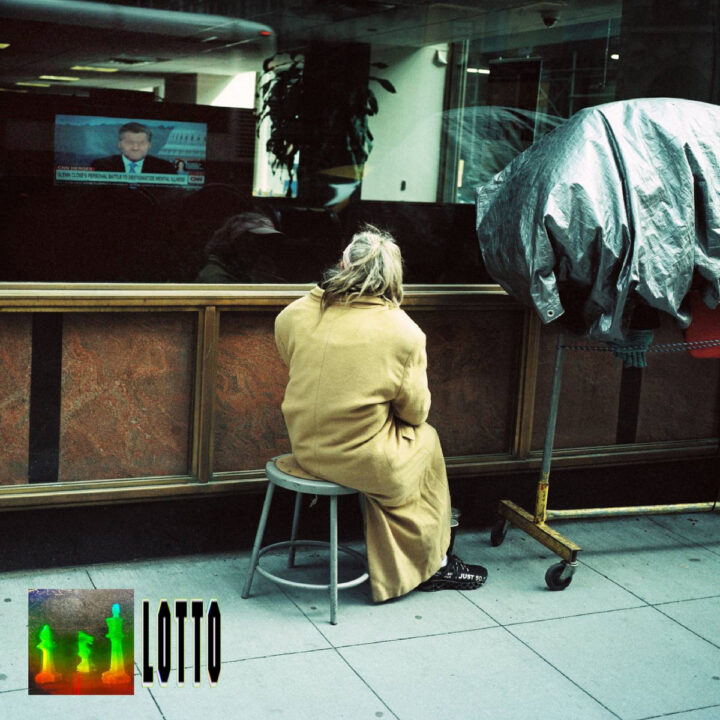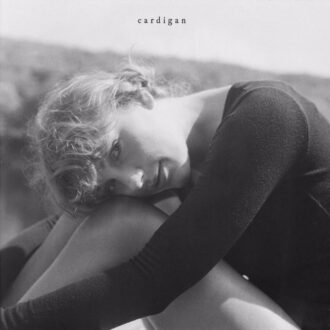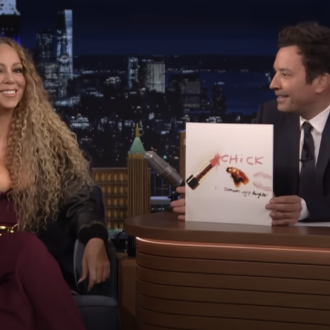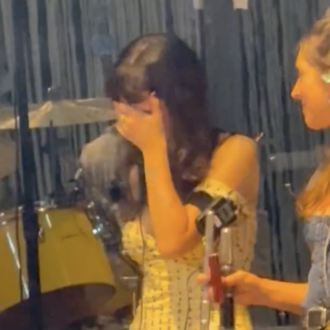He Is Getting Real: They Are Gutting A Body Of Water’s Doug Dulgarian Tells All
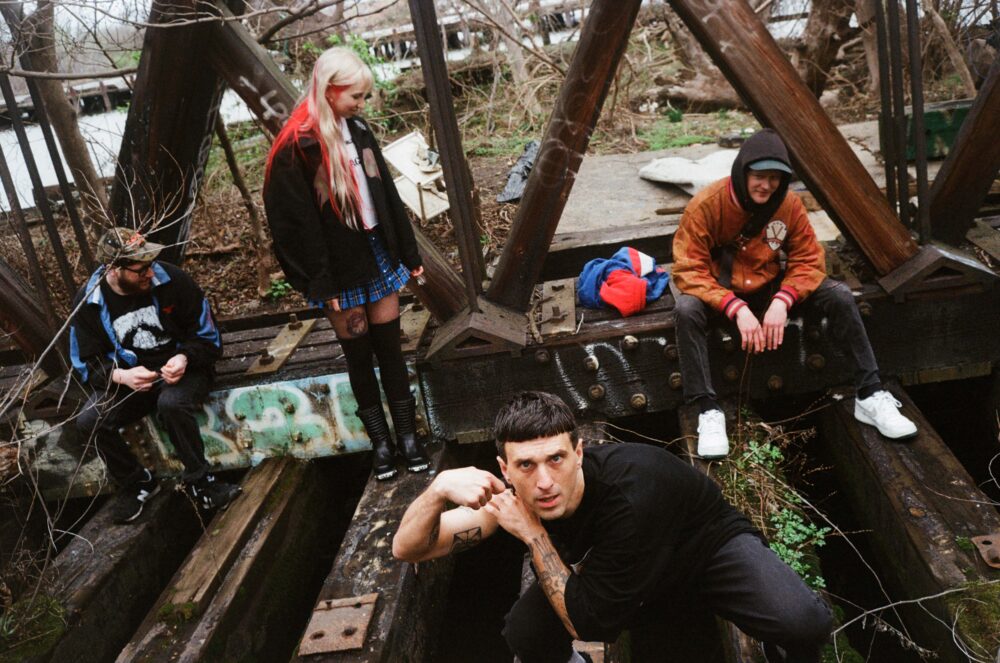
Brian Karlsson
The shoegaze maverick on new album LOTTO, his battle with heroin, how the Philadelphia Eagles bind his adopted hometown, and preserving the "dirty" quirkiness that made him fall in love with Philly
The plan was to meet at Doug Dulgarian’s apartment. Turns out I’m at his second home. Expecting a far more residential locale, I check my phone to confirm I’m in the right place. ‘I too am almost there,’ reads the text.” I cup my hand above my brow and scan the sidewalk for a familiar face.
It’s 11 a.m. and I’m standing outside a warehouse in the Grays Ferry neighborhood of South Philly. The weathered brick building seems to encompass the whole block. Dilapidated cars line the street and reversing trucks beep out of sync at the loading dock. The worn-down exterior is desecrated with offensive graffiti.
I lean back on my Toyota’s shiny silver hood, the cleanest surface I’ve seen in a mile. My home city Pittsburgh and Philly share the same governor, but Pennsylvania’s east coast metropolis buzzes at a totally different frequency. There’s an intensity here that’s always simmering. Strangers glare longer. Trash whisks down the street at a faster clip. From all I’ve read, New York City was home to this feeling at one point, but now it’s emigrated across the tri-state to escape rising rents. There’s a jagged bite in the air that breeds first-rate suffering and world-class creativity — not in isolation, but in parallel.
Eventually, I spot Dulgarian across the road, strutting up the craggy pavement, his well-worn attire blending in seamlessly with the casual scuzz. He unlocks a battered door and leads me through the dimly lit corridors, talking chipperly in between mucus-lined hacks from a residual cold. It doesn’t occur to him to explain where we are until I ask. His command center. The room we enter has the disordered charm of an “I Spy” book. Every corner serves a different discipline for the 35-year-old multi-hyphenate.
The right side is stuffed with boxes of cassette tapes that belong to Julia’s War Recordings (JWAR to the heads), Dulgarian’s DIY label that helped launch a generation of indie-rock instigators — MJ Lenderman, Wednesday, Feeble Little Horse, Her New Knife, Glixen — long before the suits caught on. The label’s released well over 70 projects since 2021, mostly from fuzzy, freaky Philly bands who inhabit the city’s guitar-mutating underworld. “Tapes don’t sell,” the bossman says with a shrug while I thumb through a pile of underappreciated JWAR gems.
On the room’s left side, Dulgarian pats the desk where he performs surgery on VHS tapes for music videos and short films. In the middle, saggy couches are littered with physical ephemera: video game cases, magazines, scraps of music gear. And in the rear, an arsenal of instruments are arranged like a summoning circle. This is where Dulgarian’s band They Are Gutting a Body of Water (TAGABOW to the syllabically frugal) practice. Where the songs that have changed shoegaze forever first come to life.
On Oct. 17, less than two months after my visit, TAGABOW will release LOTTO, their greatest, realest, most primitively satisfying album yet. It’s the band’s first on ATO Records, a well-funded indie that’s home to My Morning Jacket and King Gizzard & The Lizard Wizard. The hope is that LOTTO will be their breakthrough, an album that transcends the audience of niche cultists who understand that TAGABOW are the Pixies to the Nirvanas of TikTok-gaze. Gen-Z shoegazers like Julie and Feeble Little Horse currently play to bigger crowds, but TAGABOW are the text for shoegaze’s historically popular wave.
Their last two albums, 2019’s Destiny XL and 2022’s Lucky Styles (alternately titled “s” on streaming platforms), fried the circuits of America’s shoegaze motherboard: clangy, gloomy, more nightmarishly surreal than placidly psychedelic. LOTTO is a bit different. Scrappier. Heavier. More organically punk than the “blue raspberry” artificiality of Lucky Styles. Paramore’s Hayley Williams recently gushed about LOTTO’s singles on her Instagram story. Dulgarian isn’t sure how he feels about the album yet.
“That whole record, man,” he tells me, trailing off while shaking his head. “It’s almost too real. It pisses me off. Why did I get that real on a record? I love hiding behind shit.”
The TAGABOW songwriter, who sings and plays guitar in the quartet, has been wrestling with ego lately. He knows how influential his band is, and part of him wants to be more widely credited for it. (Until this summer, TAGABOW’s rise has been entirely grassroots; no Pitchfork or Fantano reviews; no juicy label support or brand endorsements; no celebrity co-signs or clout-hoppy proximity to the coastal fashion world).
At the same time, Dulgarian views his work with TAGABOW and JWAR as sub-divisions of a larger creative project. To preserve, with a Smithsonian-like dedication, a sound, culture, and aura that Dulgarian views as native to Philadelphia indie-rock. A feeling that Alex G, Spirit Of The Beehive, Blue Smiley, and dozens more lesser-known Philly bands created in the 2010s, and that Dulgarian is hellbent on defending from today’s tourists and interlopers. In that sense, it actually benefits TAGABOW to remain somewhat under the radar.
“What happens is that more people move to a place, the thing gets homogenized, the place gets gentrified, and people forget what the fuck it was really about,” Dulgarian explains. His accent is so strong — “wooder,” “cawfee” — that you’d think he was born in the parking lot of Lincoln Financial Field. He’s only lived in Philly for eight years, but he talks like a lifelong local, bemoaning anyone who rolls into town for a couple summers and then moves elsewhere to siphon off what another scene spent years patiently cultivating. “You’re not happening to the place, but you’re also not letting it happen to you.”
I first met Dulgarian 10 years ago when we both lived in Albany, New York. The city where his first band, Jouska, played basements and dive bars every other weekend, and where TAGABOW, initially just Dulgarian’s four-track solo project, got its humble start. The right-place/right-time serendipity allowed me to conduct the first-ever Jouska and TAGABOW interviews for a now-defunct alt-weekly paper, and since then, I’ve maintained a healthy journalist-subject relationship with Dulgarian.
I reference our shared history to emphasize that today, I feel like I’m seeing Dulgarian for the first time. He’s wearing the same stain-covered T-shirt he’s owned for a decade, and the same ratty jeans with the ankles cut off, the seams raggedly splitting. But something’s different. The protective shiftiness is gone. Dulgarian’s truth is right in front of me, unguarded.
“Admitting the truth is a practice,” he muses at one point during the afternoon, eyes fixated on the road ahead. If that’s the case, then our conversation topics throughout the day — family, insecurity, drug addiction, his undying love for Philadelphia, and all that the city has given and taken from him — must feel like marathon training.
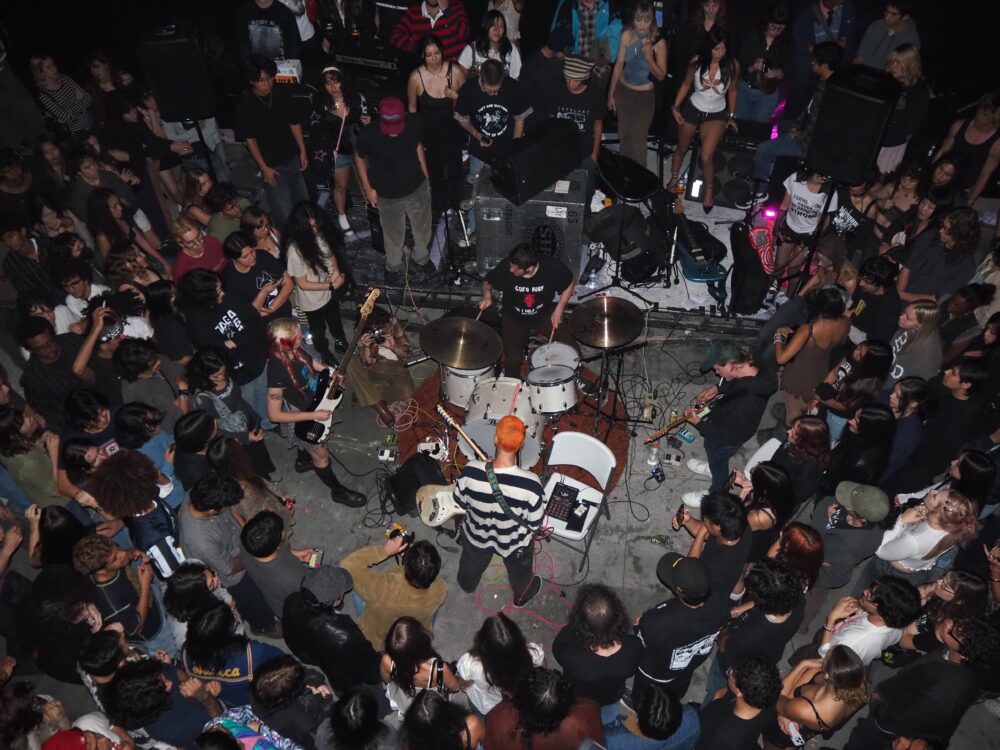
Kasey Agosto
TAGABOW fans will soon get a glimpse of the same vulnerability. With LOTTO, Dulgarian wanted to peel back the layers of the band: the inscrutable shoegaze renegades who turn their backs to their crowds, print merch that read like in-jokes, and drape their music in effects and visuals that embody the city they both physically and creatively inhabit. Caustic and cartoonish, euphoric and desolate, ecstatically cinematic and painfully real. LOTTO is TAGABOW’s most candid album yet. Recorded live with very little overdubs, it’s the sound of “four motherfuckers in a room”: guitarist-singer Dulgarian, bassist (and Dulgarian’s girlfriend) Emily Lofing, guitarist PJ Carroll, drummer Ben Opatut.
It’s also the sound of one man’s lived experience. In the high-voltage opener “the chase,” Dulgarian literally speaks his truth, narrating a harrowing fortnight of crime and drug use that left him at an existential crossroads. There are no effects for his voice to hide behind. Not even a melody to mask the shame of relapsing. Of gambling all that he’s worked for to feel just a little bit better — and then, like clockwork, so much worse.
“It’s weird when you love something more than you love life itself,” he tells me. “Anything that makes you feel that good, you gotta get away from.”
I came to Philly so I could see and smell the environment Dulgarian’s music permeates, to breathe in his every revealing exhale. After leaving the JWAR room, we spend most of the day cruising around in the banged-up TAGABOW van. The journey begins with a trip to the post office, where Dulgarian needs to pick up a vintage Eagles windbreaker that he worries will get jacked out of his locked P.O. box. On the ride over, he narrates every other block with an intimate familiarity. The van creaks and moans, whining persistently about the hundreds of thousands of touring miles it’s logged. The floor is strewn with garbage. Dulgarian keeps his phone in his lap at all times to DJ, but never once uses the GPS throughout our day of criss-crossing the city.
“Sorry for texting while driving,” he says sheepishly, his lids flicking from the screen to the windshield with a mechanical steadiness. “I’m just really good at it.”
Across from the post office, he points to an innocuous corner where he usually sees guys playing dice, and sounds disappointed that I’m not able to witness the tumbling cubes for myself. On the van’s blown-out speakers, he’s playing me an unreleased TAGABOW remix of a song by a trendy Danish pop duo. Dulgarian was thrilled to be commissioned for the track, which initiates a formal bridge between Copenhagen and Philadelphia, the two most forward-thinking indie hubs in the world right now. TAGABOW’s version of the song drips with that intangible Philly essence, and I ask him to pinpoint the regional je ne sais quoi that he loves so dearly.
“It’s quirky, but it’s dirty quirky,” Dulgarian says, grinning. He claims his ancestors were some of the first to settle in Philadelphia, so he has family buried in that very dirt. “It’s not Of Montreal — it’s Spirit Of The Beehive. Or Alex G. This dude’s talking about buying heroin, but he’s using little kid keyboards. There was something very electric about it when I moved here.”
TAGABOW’s Wikipedia states that Dulgarian grew up in Middletown, a small Orange County enclave in New York’s Hudson Valley. That’s not untrue, but really, he split his time between his dad’s place in Middletown and his mom’s house in Northern New Jersey. He describes his maternal side of the family as boisterous Italians, several of whom were literal actors on The Sopranos, a far cry from the blue-collar ruralness of his Middletown upbringing.
Doug Dulgarian Sr. is a dirt track racecar driver, a motorsport that the shoegazer compares to DIY indie-rock: a proudly scrappy, anti-corporate alternative to NASCAR. “Dirt track is some real hick shit,” he enthuses. Growing up, Dulgarian’s father worked as an auto mechanic to pay the bills, and during his teen years, Doug Jr. helped out in his dad’s garage as an auto tech. Music was only a tertiary hobby. He seemed primed to follow in his father’s motorhead footsteps, but he never got behind the wheel on the dirt track. I ask why.
“I just got into heroin,” he says with an easygoing brusqueness. It’s the most forthrightly I’ve ever heard him speak about the topic.
Dulgarian’s always had an obsessive personality. “I don’t think I could love anything halfway.” As a kid, he was diehard invested in Nintendo games, baseball, and then skating, his main teenage pursuit that introduced him to shoegaze (he first heard My Bloody Valentine in the Kids In Emerica skate video) and drugs: the twin ecstasies of his adult life. When Dulgarian was 16, he was skating while stoned when he was hit by a car that snapped his leg in half. “My leg was like salami,” he remembers, wiggling his arm to mimic the horrific injury. During his recovery, he became addicted to painkillers, and then, like millions of other Americans who’ve suffered from opioid dependency, moved on to heroin.
The next seven years of Dulgarian’s life were a wicked cycle of recovery and relapse. Drug dependency led to criminal activity, and he ended up catching a charge that landed him on five-year felony probation. At the age when most of his peers were in college and/or gigging in bands, Dulgarian was caught in a rotation of ineffective rehabs and hellish detox clinics, including a mandatory stint in a “therapeutic community” program that he says was “honest to god harder than prison.” By the time he kicked heroin and all other drugs at the onset of his mid-20s — a strict sobriety that would last five years — Dulgarian felt like a broken person.
“When I finally got clean at 23 or 24, I was mentally 15 years old,” he says.
Dulgarian was living in Albany at that point, a city he was first sent to for rehab and then later returned to for drugs. DIY music communities are often spoken of as a sanctuary for those involved, but for Dulgarian, Albany’s local scene became a literal refuge from the “grotesque” lifestyle he was trying to escape. His first house show was an epiphany: “I was like, holy shit, there’s good people that do good things.” Dulgarian’s life got a fresh start in the mid-2010s. Jouska became his new obsession, and the songs he wrote — somber, climactic, somewhere between post-rock and emo — caught the ear of Tiny Engines, then the buzziest label in indie rock, who released their 2018 EP From Elson To Emmett.
Even at their peak, the band was only a fraction as big as TAGABOW are now, but the group’s lifespan was instructional for Dulgarian. Through Jouska, he learned how to release music, how to tour, how to cooperate in a creative setting, and how to maintain genuine friendships, something Dulgarian had never experienced up until that point.
“Using drugs, you’re worried about the other person taking what you have or trying to get over on you, and you’re trying to get over on them, too,” he explains. “It was finally the first time in my life where I was like, ‘These people don’t want anything from me.'”
It’s hard to imagine a version of Dulgarian who isn’t the sincere, affable, socially nimble character I spend the day with. After trading shit-talk over Pho in South Philly, we roll over to “Walmart Beach,” a dingy pier behind the castle-sized supercenter that’s one of many slivers of busted concrete pricking into the Delaware River. Dulgarian asks to be interviewed here, where he has fond memories of seeing a feral hardcore show enhanced with amateur fireworks.
Today, the gray beachfront is empty save for two fishermen who ignore us entirely, dutifully dragging their off-white buckets along the decaying perimeter. An untamed pile of garbage slouches against the fenced shoreline to our left. In the calm river water to our right, a ginormous barge floats silently by, its electric engine eerily inaudible. Dulgarian turns to marvel at it and then shifts back toward my recorder to continue riffing about how it feels like we’re living through the end of the world.
“You’re kind of watching the American empire fall apart,” he says while my eyes spot movement in a tiny, dilapidated shed beside the next pier over. Two figures, maybe from the homeless encampment atop the riverbank, creep through the decomposing structure that’s sagging precariously into the mucky waterfront. Civilization literally crumbling in front of our faces while Dulgarian sermonizes about the end-times tenor of his fair city.
“Philadelphia, notoriously, is a hard place to live,” he tells me, gazing out at the barren horizon of post-industrial decay. “Even if you’re doing OK, you’re constantly staring at poverty. Every Papi store [Phillese for bodega] has a fucking slot machine in it and sells lotto tickets. You can get drugs in any corner of the city. I think the drugs are a symptom of the overarching experience of what it is to live here.”
Dulgarian moved to Philly in 2017. The reasoning was mostly practical. Jouska were gradually winding down, but the songwriter’s hopes for TAGABOW were ramping up, and he felt he’d outgrown Albany’s modest indie ecosystem. Dulgarian was inspired to reformat the project based on what he heard coming out of the bustling Philly underground. He namechecks Spellbinder, Cooking, Nyxy Nyx, and Sun Organ as some of his biggest musical heroes — undersung progenitors of the disheveled, lo-fi shoegaze sound that TAGABOW and JWAR have popularized in the 2020s.
“When I got here, the energy was debaucherous. Kids smashing shit at shows.” His voice gets quieter and more severe. “People were dying all the time. It’s calmed down a lot, and I’m grateful for that.”
TAGABOW’s Albany-era tapes, 2016’s self-titled and 2017’s Sweater Curse, had a homemade slowcore sound that was super influenced by Teen Suicide’s dc snuff film / waste yrself, a CD Dulgarian stole from a New Hampshire music store and left in his car’s stereo for a full year. Nobody outside of his small circle cared about TAGABOW during that period, and their first full-band album, 2018’s shoegazier Gestures Been, also fell on deaf ears.
Destiny XL was the revelation. Dulgarian totally overhauled TAGABOW’s sound and look, dropping all traces of shabby bedroom-pop and rebuilding the band’s identity around a dark, mystical form of shoegaze. The sampledelic interludes woven throughout the record recontextualize the guitar barrages against a backdrop of brash, battering electronica. TAGABOW, and shoegaze, had entered a new dimension. Destiny XL’s blacklight psychedelia is no coincidence. Dulgarian wrote the fan-favorite “eightball” while “tripping balls” on LSD, a drug he took heavily during the writing process, which ultimately escalated into his first heroin relapse in a half-decade.
“I’ve built this falsity into my brain where I think that drugs will open me up to some amount of creativity, but I know that’s false,” he says. “Even if they set me free and allow me to write the next thing, I have to deal with the consequences of that. Always.”
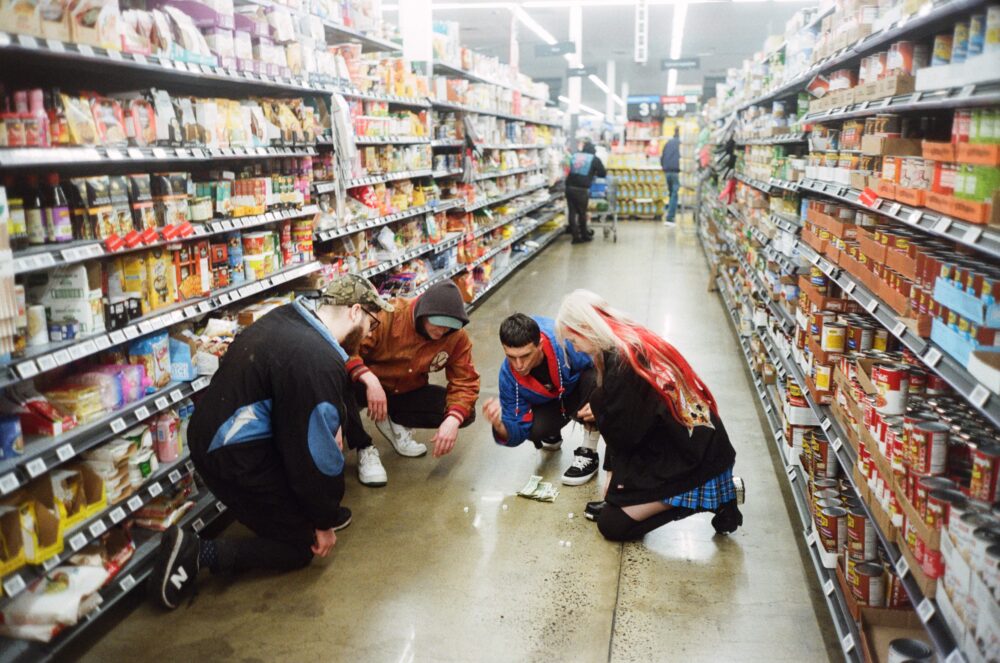
Brian Karlsson
Once the sun at Walmart Beach begins to singe the back of my neck, I ask if we can relocate to a shadier spot. We hop back in the van and head across South Philly to Bartrams Garden, one of the city’s finest public parks. On the way over, we’re listening to the weary indie-folk of Greg Mendez, a trusted collaborator of Dulgarian’s who’s something of a patron saint in Philly indie. Dulgarian queues up “Maria,” a Mendez song about relapsing on crack cocaine, and sings along softly into the windshield. “Come back to me, because it’s easy,” Mendez coos, personifying the drug’s siren call. I ask Dulgarian if that’s what it’s really like to slip up, and he nods affirmatively. “Just like that.”
The park’s serene greenery is a stark juxtaposition to the pier’s sun-bleached emptiness. We pull up to a secluded patch of grass that’s surrounded by trees — a forcefield of vegetation. Dulgarian leads me to a picnic bench that holds a sacred significance to his ongoing recovery process. Since 2019, his usage has been stop-start. He’s now been clean for eight months straight. Dulgarian hucks a Zyn pellet into the grass behind us and takes a seat on the soft, shade-chilled wood.
“I don’t know what it was, but something changed.”
Dulgarian’s talking about TAGABOW’s trajectory between Destiny XL and Lucky Styles. During that time, the American shoegaze renaissance took off and the band’s star rose immensely. Hordes of younger listeners began streaming their music and flocking to their shows, and suddenly, the band evolved from a full-time hobby to a full-time career (albeit a financially meager one). Behind the scenes, Dulgarian’s life was a grab bag of crises and celebrations.
The week Destiny XL came out, Dulgarian fell out on a strong dose of fentanyl-laced heroin. He slept for 16 hours and awoke to find that his left arm was numb and immobile. He suffered nerve damage from leaning on it for so long and didn’t think he’d ever be able to play guitar again. He ultimately recovered his mobility after months of physical therapy, but during the terrifying interim, Dulgarian kept his darkest thoughts at bay by reorienting his focus to music he only needed one arm to digitally construct: jungle.
The electronic sub-genre, composed of dizzying breakbeats and abrasive synth squelches, had occasionally brushed up against shoegaze in decades prior, but TAGABOW began fusing the two genres with a novel consistency. Their split releases with Full Body 2 (2021) and A Country Western (2022) folded locomotive jungle breaks in with the actual shoegaze guitars, accelerating the cyborgian electro-gaze transformation that began with Destiny XL, and that TAGABOW would perfect with the gloriously inorganic studio marvel, Lucky Styles.
Along with their increasingly experimental recorded material, the temperament of TAGABOW’s live shows became even more quixotic. Instead of speaking to fans during tuning breaks, Dulgarian started reaching over to his sampler to detonate howling jungle cuts. The breaks, which always drag on for what feels like 30 seconds too long — a complaint Dulgarian laughs mischievously about when I raise it — have the effect of smacking the audience out of their drowsy shoegaze stupor, further excavating TAGABOW’s music from indie-rock’s ritualistic conventions.
Dulgarian is acutely aware that one of his band’s defining attributes — the incorporation of jungle — directly stems from a drug-related calamity. Just like how his teenage drug exploits brought him to rehab facilities in Albany and Philadelphia, the cities where his love of music and community would eventually prosper.
“All these tragedies, all these things that I think are the end of the fucking world,” he says. “In the end, sometimes they prove to be important turning points that I hadn’t foreseen.”
Things are presently going well for Dulgarian. Earlier this year, Julia’s War earned a new financial investor and a distribution deal that will ideally help the label become self-sustainable in the long-run. For now, it’s a second full-time gig for Dulgarian that isn’t yet turning a profit. Meanwhile, TAGABOW’s in a great place, and Dulgarian and Lofing, his girlfriend of several years, share a cozy apartment in West Philly that the couple shows me later in the evening. I watch them tenderly feed their two hairless cats, Miracle and Memory, and lovingly geek out over Cold World, the NEPA hardcore gods whose streetwear merch designs are the primary visual inspiration behind everything Dulgarian does.
At its core, LOTTO is a record about winning life in almost every regard, yet still feeling the perverted desire to risk those winnings for something better. It’s a theme that’s relevant to Dulgarian on a personal level, and also a society-wide sickness that he confronts every time he steps outside onto the streets of Philly.
“I got this whole motherfucking life. I got a girl that I love to death who I play in a band with. We connect musically, we connect in every single way. Why am I fucking risking it to feel a little bit better with drugs?”
LOTTO’s primary setting is the hub of Dulgarian’s life: the bodega he visits every day. A mercantile of cancerous chemicals and carcinogenic lottery tickets that represents this synthetic, consumerist idea of what a city — of what Philadelphia — has to offer. But simultaneously, the bodega is a place that provides Dulgarian with nourishment, both in food and friendship. The “store” is mentioned several times throughout LOTTO, but “rl stine,” TAGABOW’s new single out today, is the song that follows Dulgarian’s footsteps there and back. “It’s a rough one to talk about,” he says with a phlegmy stutter. A song about a friend he sees outside the store each time he visits.
“I buy him a Steel Reserve and a pack of Newport 100s everyday, because he goes and he trades that pack of Newport 100s for a crack rock,” Dulgarian says, sniffling away oncoming tears. “Sometimes I wonder if I’m enabling the addict in myself. Am I living vicariously through him? Or do I really know what it feels like to feel that way?”
Throughout the day, Dulgarian brings up the Eagles again and again. He wasn’t a big sports guy until he moved to Philly, when he quickly became consumed by the city’s rabid football fandom. He stresses that loving the Eagles is about more than loving football. It’s about local identity. An interest that connects him to everyone throughout the city — his fellow DIY musicians, the drug dealers in Kensington, and the guy he’s singing about in “rl stine.”
“There’s this TV that’s always on at the bodega where I see this fool all the time. I know he doesn’t have a place to watch the game, but it’s something we talk about. It’s something we connect over. Like, ‘Yo did you see that game?’ And he knows it in these little clips and these little phrases. He didn’t watch the game, but he knows it because he saw it in the store. Because he doesn’t have a fucking house to go to, like I do.”
“I’m kind of referencing the humanity of that man,” Dulgarian continues. The tears are trickling down his cheeks. “He’s a person just like me, and he doesn’t even fucking have a house, man. And I have the house. Why am I this close to throwing it all away by doing something horrible?”
“rl stine” isn’t one of the LOTTO songs where Dulgarian speaks clearly. It’s not one of the high-velocity bangers. It’s a slow trudge, with great gusts of distortion that muffle his breathy vocals. On a whole record of gaping truth, it’s the one song where Dulgarian sounds like he’s still trying to keep a secret. At Bartram’s Garden, I’m watching him spill it.
“TAGABOW supports me and my girlfriend. And our cats. And the other band members, hopefully to some degree.” Dulgarian’s no longer looking at me as the truth unspools from his trembling jaw. “What happens if I die? What does she do? Does she have a house? Just fucked up to think about.”
He wipes his eyes and turns his gaze back toward me.
“I see so much of myself in that guy, man. We’re like the same thing. And that’s the uniting thing. Talking about sports, talking about the Eagles. You talk about that with anybody in town and everybody knows about the game even if they don’t have a TV to watch it.”
In the middle of all this heaviness, Dulgarian pauses and chirps softly, “Oh, look at these fools,” gesturing to something behind me. I have no idea what to expect. All day, Dulgarian has regaled me with tales of Philadelphia’s filthy spectacle: people taking shits on public transit, explosives at DIY shows, the risk of getting your head blown off if you cut someone off in traffic. The sinister, lawless, “dirty quirky” energy of Philly that he’s so enthralled with. But there’s another side of the city’s metaphysical essence that completes the Philly dichotomy of cold truth and sublime fantasy.
I twist around on the bench and see what made Dulgarian pause. Two horses are clomping through the grass. Their giant bodies are so bewilderingly out of place in this urban oasis. Their riders are chatting casually amongst themselves while the gentle beasts flick their manes and prance forward with stately pride. Our intense conversation is put on hold while we both stare in silence. Letting the gravity of what was said sink into the picnic bench’s surface, settling into the wood among the moss stains. Eventually, Dulgarian speaks. His tone is perky and grateful. Like he’s witnessing an act of divinity from the city he worships with a religious piety.
“Philly’s not real.”
For years, I’ve heard it in the music from here. But at this moment, I finally see it. I finally feel it. Philadelphia, TAGABOW, Dulgarian, and the uncanny truth that binds them.
LOTTO is out 10/17 via Julia’s War/Smoking Room/ATO.
